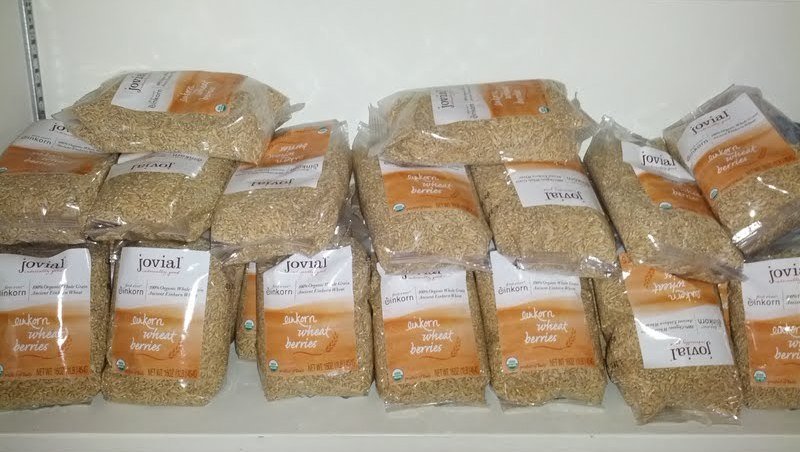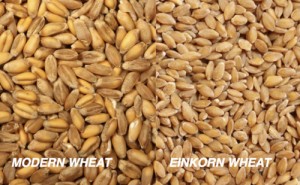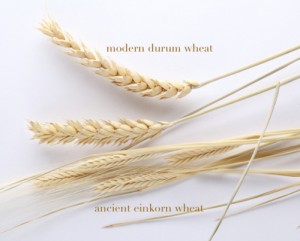Einkorn is the only form of wheat on Earth that is completely unhybridized, containing the good gluten that even sensitive individuals can usually eat. Consuming it has four main benefits.
In my home, I’ve purchased organic white wheat and spelt in bulk for many years. Grinding it into fresh flour is the most nutritious and tastiest way to bake! I also did this to avoid the conventional toxic wheat in North America.
Farmers on this continent frequently desiccate their crops with glyphosate-containing herbicides. This practice is beneficial for ease and speed of harvest.
I credit this approach with my family avoiding any wheat allergies or problems digesting grains in general. This is true provided they are traditionally prepared. Bulgur is an example of this ancestral practice still widely used today.
For those of you who do have wheat issues, you’ll be encouraged to know that my husband used to have allergy and digestive issues with wheat years ago. He no longer does thanks to careful avoidance of wheat for several years, rebalancing the gut with traditional cooking, raw dairy, and the GAPS Diet.
Having a lot of experience dealing with wheat allergies, I can say that there certainly is a huge difference between modern processed wheat, products made with it such as seitan, and what you produce yourself at home.
I remember when I was breastfeeding my youngest child, if I ate so much as a mouthful or two of processed wheat at a restaurant in the form of a sandwich, slice of pizza, or a bread roll, she would spit up for one or sometimes even two days!
If I ate wheat that I ground myself and either sprouted, soaked, or sour leavened, however, she never had any spit up issues. To me, this was a huge testament to the radically improved digestibility of wheat that is prepared using the wise methods of ancestral cultures.
Einkorn Health Benefits over Modern Wheat
Given my success over the years with incorporating traditional methods of wheat preparation in my home, you may be surprised to learn that I’m switching the type I use.
What’s more, I’m switching 100%.
I still have about half of a large bucket of organic spelt to use up and a small amount of organic soft white wheat before the switch is complete. My goal is to have my family completely transitioned to einkorn wheat within another month or two.
Here are the 4 reasons why I am making the wholesale change to einkorn. Note that this strain is not to be confused with farro or heirloom wheat:
#1: Better Taste
My first experience baking with einkorn occurred after I received a thoughtful gift of, among other things, einkorn flour and wheat berries. I was delighted when I ground the einkorn into flour and saw how light and white it was.
I am not a fan of bran and am not of the food philosophy that all that fiber is actually good for you. Folks just think they need a lot of fiber as they are so constipated from all the processed foods they eat! Observing that einkorn, the most ancient and unhybridized form of wheat, has less bran compared with modern wheat was encouraging to me.
I was thrilled to see that my family thoroughly enjoyed the soaked waffles made with fresh einkorn flour. It was my first einkorn dish! Ever since they have asked me to use only that flour.
Like any Mom, I’m a sucker for kids who love my cooking and tell me so on a frequent basis. So, I made the easy decision to switch to einkorn completely for all my home baking.
#2: More Digestible
My husband’s stomach is my canary in the coal mine. If something is not easy to digest, he can tell and lets me know right away. As he has fully recovered from a wheat allergy, he knows which forms of wheat and which preparation methods sit best in his stomach and which do not.
While my properly prepared grain dishes made with wheat or spelt digest fine for him, once he tried the einkorn, he could tell that his digestion was even lighter for the experience. This is possibly because einkorn contains good gluten, different on a molecular level from modern gluten. It is much better tolerated by those with gluten sensitivity.
Better digestion means better absorption of nutrients, so einkorn surpassed the competition in that category.
#3: Einkorn is Visually Different

The first thing I noticed when I ground einkorn into flour for the first time was how much smaller a grain of einkorn is compared with a grain of modern wheat. They are about half the size!
In addition, the telltale crease on one side of a grain of modern wheat is absent from a grain of einkorn. The reason for the differences is that over the centuries, the genetics of wheat gradually changed due to human cultivation practices.
Year after year, farmers selected the seeds at harvest time that suited the goal of higher yields and more gluten. This worked best for big farms and larger-scale agriculture, production, and distribution of wheat products.
#4: Only Unhybridized Wheat on Earth

Einkorn is like most plants in that it is diploid. This means that contains only 2 sets of chromosomes. About 2,000 years after einkorn wheat, nature created emmer via the hybridization of 2 wild grasses. Consequently, emmer has 4 sets of chromosomes. Kamut and durum (bulgur) wheat are both descendants of emmer.
Spelt, an heirloom wheat, is the result of hybridization between cultivated emmer and another wild grass. Thus, it contains six sets of chromosomes. Modern wheat is a descendant of spelt.
Note that while humans extensively hybridized wheat over the millennia, there is currently no genetically modified wheat on the market. In the Western United States, however, test plots of GMO wheat have caused some contamination issues.
As you can see, einkorn is the purest and most ancient form of wheat available. It has only 2 sets of chromosomes with a very different composition of gluten. This form is easier to digest for many with non-genetic gluten intolerance.
Where to Source the Best Quality Einkorn
The only downside of einkorn is that it is not widely available and tends to be more expensive than other types of wheat. It is still quite new to the North American market.
My healthy shopping guide lists sources that I’ve vetted that are fast and affordable to ship to your door. I use these reliable companies myself and have for many years.

The organic einkorn wheat berries from these sources are grown and packaged on one secluded and pristine farm in Tuscany. It is very important to rotate crops on this farm. This is due to the hilly terrain, where yields are low and the land must stay fertile.
What this means is that this particular source of organic einkorn comes from fully pastured fields for five years prior. In addition, soil nutrition is enhanced using one year of crop rotation with the cultivation of chickpeas, lentils or fava beans. This ensures that there is no risk of cross-contamination with other types of grains. Each year’s crop of einkorn comes from truly fertile earth!
Have you tried einkorn wheat yet? If so, what observations have you made about this ancient, unhybridized wheat?
More Information
Sourdough Crackers with Nut Butter
No-Knead Sourdough Bread
Teff Nutrition








HI, I HAVE READ DR. WILLIAM DAVIS BOOK, WHEAT BELLIES, AND YOUR REPORT OF THE EINKORN WHEAT IS EXACTLY RIGHT, BECAUSE HE SAID IT’S BECAUSE OF ALL OF THE HYBREDSATION (IF THAT IS CORRECT) THAT THIS IS WHY SO MANY PEOPLE ARE GETTING CELIAC, HIGH COLESTEROL, EXCESSIVE WEIGHT , ETC, BECAUSE THEY HAVE CHANGED THE WHEAT SO MUCH, WITHOUT EVER HAVING TESTED IT IN THE HUMAN BODY. WHERE CAN I GET THIS ORIGINAL UNMODIFIED WHEAT? THANK YOU!
See my Resources page … this is where I buy it. https://www.thehealthyhomeeconomist.com/resources/#flours
Hi,
I’ve really been enlightened here about first sifting freshly ground flour before using it. However, if I’m making bread, what is the process for soaking? I’m guessing that after grinding and sifting, I then mix the flour with the water portion, and then after it’s soaked about 8 hours or more, I then go ahead and add the yeast and then let it start it’s first proofing session? Or, is the fermenting process on its own enough to deactivate the anti-nutrients? Thank you!
ANCIENT ISRAELI GRAINS
The 5 Grains of Israel were mistranslated over the 2,000 years of Exile in Europe. Only grains that are indigenous to the Land of Israel are the authentic 5 Israeli Grains, as explained in the Mishnah Hallah 1:1:
שיפון Shippon (shifon) — einkorn wheat (T. monococcum),
כוסמין Kusmin — emmer wheat (T. dicoccon),
×—×™×˜×™× á¸¤ittim — durum wheat (T. durum) and bread wheat (Triticum aestivum),
×©×¢×•×¨×™× Se’orim — six row barley (Hordeum vulgare), and
שיבולת שועל Shibbolet shual — two row barley (Hordeum vulgare).
If someone is celiac, they should NOT eat any type of wheat, even ancient israeli Shippon (T. monococcum) aka Einkorn. Be in touch for details.
Eli Rogosa
growseed.org
Heritage Grain Conservancy
Hi,
I have a friend, who’s Celiac, and who lives in Israe’l.
Since she’s Jewish, and should theoretically make a special blessing on the Sabbath and Jewish Holy Days over bread made from the 5 main grain types, which ever grew there (wheat, rye, barley, oat – and one other I forgot), she’s forever looking to find a flower from one of these grains, that has the gluten taken out of them.. Years ago, she was able to get a such a flour made from wheat from a Swiss company, but they don’t make it anymore.
So now, she’s looking again for ages already to find something like that.
I would like to send her a package with organic wholemeal Einkorn flour, to try it out, but if she doesn’t have symtoms after eating the bread made with it, should she then go to her doctor, to check, if it nonetheless destroys her intestine? Can a doctor at all find out, if that’s the case?
What to do? Does anyone have knowledge about this?
Thank you in advance!
Thanks for the great info on Einkorn! I’ve been wanting to try it. I noticed your statement that no GMO wheat is sold in North America. Some believe is it, secretly. I’m no conspiracy theorist, but I have come across articles like this that do make me wonder:
http://www.kingarthurflour.com/flours/gmo-wheat.html
I’ll be ordering Einkorn from the supplier you use. Excited to try it!
Hi Sarah,
I my humble opinion you are playing a very dangerous game allowing any gluten in your diet regardless of the quality of einkorn. If you have multiply auto immune conditions then you are clearly gluten sensitive and that requires a ZERO gluten approach. Not even small grains of gluten.
Gluten in your diet will continue to stimulate memory B cells which prime your immune system to continue its onslaught on your own tissue. Cyrex labs do four panels which will tell a) is my gut leaking b) how many gluten antibodies am I making c) which foods cause gluten cross reactions and d) they have a panel that identifies which tissue your immune system is attacking. Very useful.
Regards Gary
Haven’t tried Einkorn yet, but I will soon. My local co-op here in Sierra Vista, AZ now carries organic berries in their bulk section for $4.29/lb. I’ll cook them the same way I cook wheat or rye berries but I wondered if you had to have a grain mill to grind into flour. If I’m just grinding a very small amount can I use a coffee grinder or will that not make it fine enough to bake with? Thanks!
So, I’m good with the soaking and switching, etc. but my main question is, in your opinion, what am I to do about digestible pasta for my family? Jovial makes pasta but it’s not sprouted. Am I stuck with Ezekial 4:9’s limited options? Should I just move on from pasta? I really don’t think that with a newborn anyday now and a 16 month old that I am going to take on the newest task of pasta making right now… =) Thanx for your help!